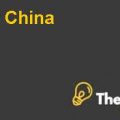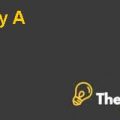
Question No. 1: What are the risks associated with Deluxe’s business and strategy? What financing requirements do you foresee for the firm in the coming years?
Answer:
The company Deluxe Corporation was engaged in the business of making printer paper checks in the region of the United States of America. Recently, the company had discharged all of its long term debts and had not even issued a major bond in nearly 10 years. Even though, the company’s products was in development and mature life cycle stage, but the CEO of the Deluxe Corporation, Lawrence J. Mosner anticipated deterioration in the demand of the product. With the advancement in the technologies, for example, e-transfers, ATMs, Debit and Credit Cards, the old products will be outdated. As a result of that, there will be very low scope or area for the new products in the existing line of business. As expected by the CEO, the printing papers, business has almost reached to its maximum point and from now on demand will only decline.
After considering the point of view of the CEO of the business, one could predict that the collapse in the business of the printing paper check would help the other businesses, i.e. the electronic business will be responsible for the downfall of the printing papers check. In this regards, the increase in the spun off of eFunds increases the risk in the sense that the company would lose growth opportunity. On the other hand, the Deluxe Company has lost divergence by spinning-off two companies. These companies who were in the business of electronic payments could have provided better opportunities and a diversified business than the printing checks.
Only a few participants govern the business in the whole market because that the printing business normally works on big scales of economies, because of this the potential disagreement in prices would be a risk in the future. Financial forecast given in the case study shows an increasing trend in the cash flows of $212 million in 2002 to $229.7 million in 2006. Cash position was also increased to $625 million till 2006, on the other hand, the debt level of the company stays static at $161.5 million. Sales were forecasted at the rate of around 26.7%. As a result of that, the interest coverage ratio remains strong. Although, the forecasted values should not bother the company, but above mentioned business risk and an increase in the pressure from the members of the company raises doubts over the forecasted results and overall financial position of the Deluxe Corporation. If we talk about the Earnings before Interest and Taxes (EBIT), risks involve being over the requirements for potential acquisitions, for net working capital changes, repayment of short-term debt, capital expenditure, interest expense, dividend to shareholders and possible repurchase of common stocks.
Question No. 2: What are the main objectives of the financial policy that Rajat Singh must recommend to the Deluxe Corporation’s board of directors?
Answer:
The main objective on which the company was focusing was the spun off of two companies. After the proper spin-off of both companies, efunds and iDLX, the Deluxe Corporation was placed as proper play check printer, which means, the options of diversification and restructuring were already gone. On the other hand, Deluxe Corporation was also done with the share repurchase program. For this drawback, the core objectives of financial policy have been minimized till maintain an investment grade rating, minimize WACC (to raise funds at low cost), keep reserve for more restructuring if needed, revolving credit facility and more importantly, making the company attractive to the potential investors of the company in the capital market to raise more fund if required.
Question No. 3: Drawing on the financial ratios in case Exhibit 6, how much debt could Deluxe borrow at each rating level? What capitalization ratios would result from the borrowings implied by each rating category?
Answer:
As shown in the appendix, the Deluxe Corporation needs external funds. This is an alarming situation for the company, as it has already discharged its long term debt and in future they will be needing more debt to finance its future potential projects. Refer to appendix.......................
This is just a sample partial case solution. Please place the order on the website to order your own originally done case solution.
In July 2002, the investment banker advising Deluxe Corporation shall prepare a recommendation to the Board of Directors in relation to the financial policy of the company. Special considerations combination of debt and equity, and maintaining financial flexibility. "Hide
by Robert F. Bruner, Susan Chaplinsky, Sean Carr Source: Darden School of Business 20 pages. Publication Date: December 8, 2005. Prod. #: UV1388-PDF-ENG












